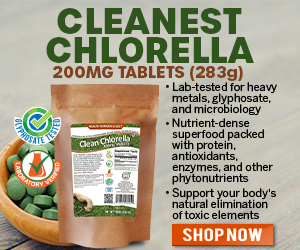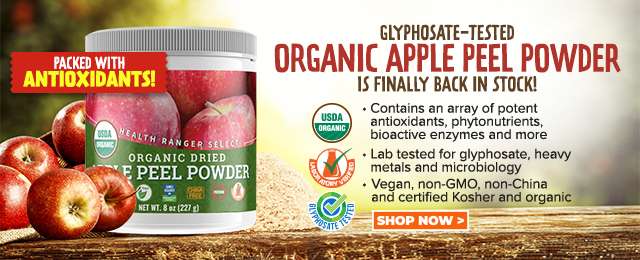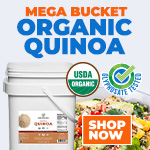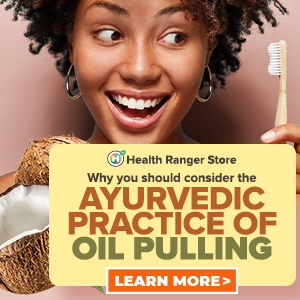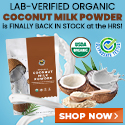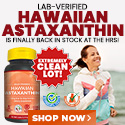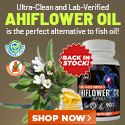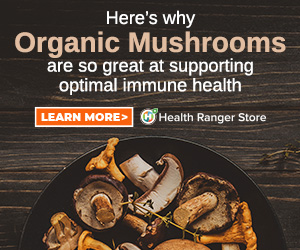
Dehydrated, Hydrated, Waterlogged: How Much Water is Too Much?
Wednesday, January 09, 2008 by: Peggy Gannon
Tags: hydration, health news, Natural News
- Criminal referral requests filed against Fauci and top COVID officials in seven states
- Photonic revolution: New chips process data using light instead of electricity
- Dane Wigington exposes climate engineering as ‘All-Out Weather and Biological Warfare’
- Pfizer's RSV vaccine linked to preterm births as drug giant CONCEALED RISKS from pregnant women in unethical clinical trials
- Sen. Johnson demands COVID vaccine makers hand over all documents, communications, as evidence against their products reaches a climax
- Aluminum, essential to vaccine science, also causes serious health conditions, including chronic fatigue, neurodegenerative diseases, macrophagic myofasciitis
- Israeli lobbyists boast of controlling US national security policy in leaked AIPAC audio
- Aerosolized bioweapons? Strange “diploid biomasses” falling out of the sky in Florida captured under the microscope
- Analysis: The coming economic collapse, a mass uprising and Trump's three secret weapons to halt the growing revolt
- DOGE unveils $400M unemployment fraud scandal: Toddlers, futuristic birthdates fuel outcry
- Tulsi Gabbard leads charge against the Biden regime’s global censorship of the 'Disinformation Dozen'
- Chemtrails unveiled: How the CIA and Big Business are manipulating the weather for profit
- Shedding light on the dark side of MMR vaccines: How vaccinated individuals SPREAD MEASLES & put the vulnerable at risk
- Fauci is back in the limelight, and he’s busy promoting a future COVID or FLU pandemic
- Widespread social and economic unrest: Steve Quayle issues urgent financial warning of imminent asset collapse in new interview with Mike Adams
- Gardening tips: 15 Simple tricks to double your garden’s yield this season
- Oats: A nutritional powerhouse for health and wellness
- U.S. lawmakers investigate Meta over alleged China collaboration
- Aerosolized bioweapons? Strange “diploid biomasses” falling out of the sky in Florida captured under the microscope
- Widespread social and economic unrest: Steve Quayle issues urgent financial warning of imminent asset collapse in new interview with Mike Adams
- Tulsi Gabbard leads charge against the Biden regime’s global censorship of the 'Disinformation Dozen'
- Fauci is back in the limelight, and he’s busy promoting a future COVID or FLU pandemic
- Analysis: The coming economic collapse, a mass uprising and Trump's three secret weapons to halt the growing revolt
- Kiss Your Genetic Privacy Good-Bye! 23andMe Gets Green Light to Sell Your Intimate Genetic Details to Anyone They Want
- CLOT SHOT PLANDEMIC UNFOLDING: Fibrous, rubbery clots caused by covid injections have prion-like seeding activity
- Mike Adams releases country western hit single: Goin’ Back in Time is Comin’ Home
- DEATH by VACCINE or face PRISON time: Canadian Freedom Convoy leaders CONVICTED for protesting forced vaccination during the Covid Plandemic
- Tulsi Gabbard takes aim at censorship: Justice for the ‘Disinformation Dozen’
- How Israeli military-connected corporations are secretly controlling your online privacy
- European Court of Justice: Healthcare professionals who promoted or administered COVID-19 vaccines are CRIMINALLY LIABLE for any harm caused
- Defunding DEADLY mRNA jabs: Government funding for mRNA technology being scrutinized and sidelined until proven "safe and effective" for real
- U.S. lawmakers investigate Meta over alleged China collaboration
- Federal employees whine over DOGE's new directive requiring them to do a 5-point summary of weekly accomplishments
- U.S. approves new Russian ambassador as diplomatic thaw continues
- Trump administration poised to overhaul crypto regulations with new SEC leadership
- I Want My Bailout Money – new song and music video released by Mike Adams
- Newly released JFK files reveal Pentagon's role in creating Lyme disease and covid in the same lab
- Analysis: The coming economic collapse, a mass uprising and Trump's three secret weapons to halt the growing revolt
- Mike Adams releases country western hit single: Goin’ Back in Time is Comin’ Home
- MEDICAL BOMBSHELL: FDA admits Covid mRNA 'Vaccines' CAUSE CANCER
- Aerosolized bioweapons? Strange “diploid biomasses” falling out of the sky in Florida captured under the microscope
- Trump reverses course on Gaza plan, says “nobody is expelling Palestinians”
- Dr. Mike Yeadon releases 15-minute testimony - WATCH - about genocidal intent of COVID “vaccines”
- Kiss Your Genetic Privacy Good-Bye! 23andMe Gets Green Light to Sell Your Intimate Genetic Details to Anyone They Want
- 5 Simple steps to boost your brainpower: How to strengthen executive function in a distracted world
- A lack of integrity in Academia: Harvard professor found GUILTY of fraudulent research to promote CRT theory
- The Health Ranger releases “Vaccine Zombie” song and music video, using AI-animated zombies for the music video
- California's social media censorship law struck down: A victory for free speech or a threat to online safety?
- Rep. Nancy Mace introduces bill to ban biological males from female facilities on federal property
- EPA advisor admits the agency is funneling billions to climate groups ahead of Trump’s return to White House
- Survival 101: Effective EMF blocking techniques
- OpenAI whistleblower who dissented against how the company trained ChatGPT found dead
- Space war brewing? Russia threatens to destroy Starlink satellites
- European Court of Justice: Healthcare professionals who promoted or administered COVID-19 vaccines are CRIMINALLY LIABLE for any harm caused
- Red Cross issues warning to stop blood plasma donations from vaccinated people
- Scientists confirm: GENIUS brain function can be spontaneously unleashed in humans without any apparent cause
- EPA advisor admits the agency is funneling billions to climate groups ahead of Trump’s return to White House
- HYSSOP: What research reveals about the health benefits of this ancient holy herb
- Two containers with completed ballots fall out of truck in Florida
- Newly released JFK files reveal Pentagon's role in creating Lyme disease and covid in the same lab
- Global leaders unite to clamp down on “misinformation” with UN-backed Cascais Declaration
- Fully vaccinated about to see “tsunami” of illness and death, warns virologist
- BREAKING: 2025 NDAA authorizes mandatory military draft of WOMEN across America… as Pentagon pursues global NUCLEAR war with both Russia and China at the same time
- Michael Yon warns of a ZIONIST TAKEOVER in Trump’s second administration
- Ozempic and Wegovy weight loss drugs are injectable LIZARD VENOM PEPTIDES that may unleash a devastating wave of organ failure… side effects align with symptoms of SNAKE BITES
- The Health Ranger releases “Vaccine Zombie” song and music video, using AI-animated zombies for the music video
- BOMBSHELL: DNA testing kits are a SCAM to develop ethnic-specific bioweapons
- Mike Adams releases country western hit single: Goin’ Back in Time is Comin’ Home
- Israeli soldiers accused of even more torture and abuse in the West Bank
- These 13 countries just signed an agreement to engineer a global FAMINE by destroying food supply
- NASA admits that climate change occurs because of changes in Earth’s solar orbit, and NOT because of SUVs and fossil fuels
- RFK Jr. clears key hurdle: Sen. Susan Collins backs controversial HHS nominee, signaling a new era for health policy
Water truly is the stuff of life. Our body is 70% water, our brain is 85% water, blood is 90% water and the liver (which filters out toxins) is 96% water. We can endure for weeks without food but only three days without water. Chronic dehydration can mimic symptoms of disease, such as headache, dizziness, fatigue, irritability and depression.
Oddly, our level of thirst is not a reliable indicator of our need for water. For some people a headache is the first sign that the body needs more water. Water loss occurs all day long through respiration, perspiration, urination and elimination. Experts agree that 64 oz. a day is the minimum intake to meet our most basic requirements, such as skin hydration, temperature control, digestion and waste disposal. That's eight 8-oz glasses. And I do mean glass. Storing your water in something other than plastic means that you will not be picking up traces of chemicals (like phthalates) that leach from plastic containers.
Having established the importance of adequate water, is it possible to drink too much of such a good thing? Although it's unlikely, the answer is "yes!"
The opposite of dehydration is a condition known as hyponatremia. No, it doesn't mean "drowning"; it actually means "low sodium" and is sometimes referred to as water intoxication. Drinking too much water in too short a time overwhelms the kidneys and can cause a sudden drop in blood sodium levels. Sodium is one of the body's electrolytes (the others are potassium, chloride and bicarbonate). A drop in sodium leads to water entering the brain, causing it to swell. Results include lethargy, disorientation, confusion, seizures, coma and death.
Hyponatremia typically occurs in hot weather when people engage in strenuous activities, sweat a great deal, and then drink gallons of plain water. The answer for people like marathon runners who sweat profusely is a sports drink that will replace the lost electrolytes. An alternative is a quart of water to which you add a half teaspoon each of salt and baking soda. Hyponatremia will not happen to people who spread their normal intake of water over the course of a day.
For those who want to be really precise about personal hydration, there are resources on line that will factor your weight, level of physical activity, and ambient climate and calculate a specific recommendation. Go here: (http://tinyurl.com/2awg72) .
Does personal hydration have to be water? Not necessarily. Tea (especially herbal teas), broth, fruit and vegetable juices all count toward your daily fluid intake, but the emphasis should be on pure water. Coffee and alcohol are diuretics and are better avoided. If plain water fails to excite you, try a splash of lime or lemon, or a few drops of mint extract, to give it a bit of zing. But please, no sodas. We all know why.
About the author
Peggy Gannon lives on a 50-acre farm, where she is owned by three parrots and a few cats. She taught at Unity College in Maine for 18 years, and has in the same lifetime been a small farmer, public relations director, commercial horticulturist, and mental health professional. Her poetry and nonfiction have appeared in a variety of literary and other small magazines. She has pursued a lifelong interest in health and nutrition and is a vocal advocate of local and organic foods. When not writing, she keeps busy gardening, traveling to exotic and arcane locales, and periodically emptying the bag on the vacuum in deep space.Hydration at FETCH.news
Get independent news alerts on natural cures, food lab tests, cannabis medicine, science, robotics, drones, privacy and more.
Take Action: Support Natural News by linking to this article from your website
Permalink to this article:
Embed article link: (copy HTML code below):
Reprinting this article:
Non-commercial use OK, cite NaturalNews.com with clickable link.
Follow Natural News on Facebook, Twitter, Google Plus, and Pinterest
Science News & Studies
Medicine News and Information
Food News & Studies
Health News & Studies
Herbs News & Information
Pollution News & Studies
Cancer News & Studies
Climate News & Studies
Survival News & Information
Gear News & Information
News covering technology, stocks, hackers, and more



"Big Tech and mainstream media are constantly trying to silence the independent voices that dare to bring you the truth about toxic food ingredients, dangerous medications and the failed, fraudulent science of the profit-driven medical establishment.
Email is one of the best ways to make sure you stay informed, without the censorship of the tech giants (Google, Apple, Facebook, Twitter, YouTube, etc.). Stay informed and you'll even likely learn information that may help save your own life."
–The Health Ranger, Mike Adams










